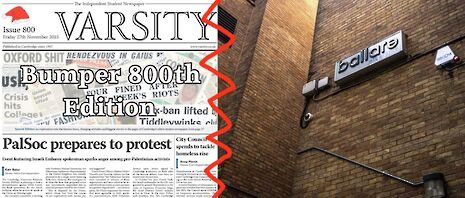Give student journalism a try – it’s worth it
Having your name in print feels better than getting drunk in Cindies once a week

I’m at Cambridge. There’s the Union, the battleground of the infamous Richard Dawkins vs Rowan Williams 2013. There’s Footlights, the hotbed of those hilarious smokers and twenty-first century Stephen Frys. And who could forget the miscellany of rowing-related socials – the ‘Boatie Swaps’, ‘Boatie Cocktails’ and ‘Boatie Barbeques’. Faced with this buffet of extra-curriculars, each flavoured with political ambition, side-splitting laughter and ‘rah’ culture in general, why do I turn to student journalism? Forget the kitsch image you might have of traipsing around in an oversized trench coat with a fedora, scribbling shorthand on a moleskin notepad. At Cambridge, the reality of writing for a student newspaper will boil down to a single choice. For me it’s normally this: “I’ve just submitted my weekly 2500+ word essay; should I carry on writing?” I could go out that night or instead stay hunched for a fair few more hours in front of my computer, frenetically typing up a comment piece rather like the one you’re reading now, in time for the deadline tomorrow. I never regret the option I plump for.
It is a well-known irony that studying at one of the best universities in the country (I’m going off the highly academic-centric criteria of the Times Higher Education and The Guardian League Tables here, I’m well aware) doesn’t make you feel any more confident in your views and intellectual understanding – quite the opposite. Multiple times a week, if not everyday, you are going to meet somebody more ‘intelligent’ or ‘cultured’ than you. Of course, you meet people like that everywhere – but the interaction is so much more visceral and pronounced over here. Back at school I was surrounded by girls who ostensibly dismissed their 90 per cent scores as flukes and when forced to acknowledge their achievements (academic or otherwise) would drape them in a veneer of false modesty. Here is the essential paradox: there is no fear of being labelled as a ‘geek’ at Cambridge, because everyone knows they are. And because of the universality of this sentiment it transpires that nobody feels like a ‘geek’, and thus they actually start craving the label they shunned at school.
So what does this have to do with student journalism? For anyone who hasn’t written for a student newspaper yet, more than you might think. Our intellectual egos and academic pretentions take a battering in supervisions and even in drunken conversations with friends outside Cindies (the feeling of being the only one in the group who can’t speak fluent French in an inebriated state is a humbling one, to say the least). But having your name in print, along with your insights on issues that have a real impact on our daily lives, lifts them back onto a platform of legitimacy. You can form just as nuanced an opinion of ‘high culture’ as the guy from Eton on your corridor. That’s why you head down to the Corpus Playroom that night to review something, with the knowledge that your rating might make or break the ticket sales.
This Michaelmas, I was surprised at how unsettling I found the experience of interviewing Jackie Ashley. If I had done the same interview before I arrived at Cambridge I don’t think I would have experienced the same feeling. Yet, the very act of interrogating someone in a position of authority was a completely inverse situation to those of the supervisions my university life had revolved around in the previous four weeks. Finally, it was my turn to launch the ‘attack’ (an utter dysphemism, I can assure you).
Even when you omit the free tickets to shows and the chance to enjoy the company of a quasi-celebrity speaking at the Union, student journalism is exciting stuff – in this day and age it can be positively dangerous. “You kids don’t take things seriously enough” might be the line your college porter drops when someone dolefully comes up to the counter asking for a spare room key after locking themselves out for the umpteenth time. The same could be said for journalism. If I, as a lowly Fresher, have any advice to give about writing for a student newspaper, it is simply: think before you write. It will get retweeted, reposted on Facebook, not to mention converted into that dratted .pdf file that takes just too long to download. Being a student journalist in 2015 means your thoughts will now be written forever. I am studying for a degree in History – and I don’t know about you, but a small part of me wants to go down in history, as well.
 Features / Should I stay or should I go? Cambridge students and alumni reflect on how their memories stay with them15 December 2025
Features / Should I stay or should I go? Cambridge students and alumni reflect on how their memories stay with them15 December 2025 News / Cambridge study finds students learn better with notes than AI13 December 2025
News / Cambridge study finds students learn better with notes than AI13 December 2025 News / Dons warn PM about Vet School closure16 December 2025
News / Dons warn PM about Vet School closure16 December 2025 Comment / The magic of an eight-week term15 December 2025
Comment / The magic of an eight-week term15 December 2025 News / News In Brief: Michaelmas marriages, monogamous mammals, and messaging manipulation15 December 2025
News / News In Brief: Michaelmas marriages, monogamous mammals, and messaging manipulation15 December 2025








